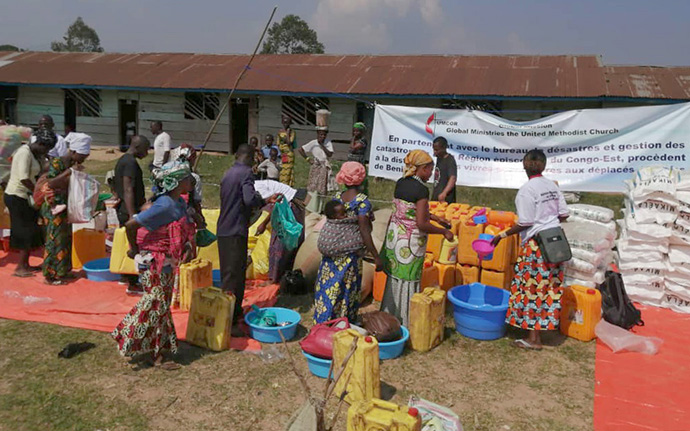
Key points:
- $50,000 in aid was distributed to people in Beni who have fled attacks in outlying areas. Beni is one of the six ecclesiastical districts of the Kivu Conference.
- The aid helped buy 38 tons of food including rice, wheat, vegetable oil, beans, cooking salt and sugar.
- Repetitive wars since 1960 have been especially tough on the eastern region of Congo, said East Congo Bishop Gabriel Yemba Unda.
Five hundred displaced families living in Beni, a city in northeastern Congo, recently received assistance from The United Methodist Church.
Fifty thousand dollars disbursed by the United Methodist Committee on Relief’s International Disaster Response program helped buy 38 tons of food, including rice, semolina (wheat), vegetable oil, beans, cooking salt and sugar. Also purchased were empty jerrycans (sturdy liquid containers), plastic household basins and hygiene items.
Complete rations for one month were distributed to “the most vulnerable displaced households … to enhance their living conditions as they face the crisis,” said Bintou Diao, program manager for UMCOR’s International Disaster Response program.
The aid was part of a larger $100,000 UMCOR grant issued in June to support internally displaced persons in Beni and Rutshuru in East Congo.
“The eastern region of Congo is the part of our country most affected by repetitive wars since 1960, when Congo gained its independence,” said East Congo Bishop Gabriel Yemba Unda.
The assistance was channeled through the Eastern Congo Natural Disaster Management Office. Beni is one of the six ecclesiastical districts of the Kivu Conference.
Since 2014, residents of Beni have lived under the threat of brutal attacks as armed groups battle for land and the country’s rich mineral resources. Militants routinely invade villages, burn houses and kill and injure civilians.
Members of The United Methodist Church in the region have been affected by the violence. In 2016, a dozen United Methodists were killed in attacks. At least seven United Methodists from two families were killed in deadly violence in early 2021, according to the Beni District superintendent.
The neighboring province of Ituri, bordering Uganda, is also affected by violence attributed to the rebels of the Allied Democratic Forces, considered the deadliest of the multiple armed groups that have plagued eastern Congo for more than a quarter of a century.

Jean Tshomba, coordinator of UMCOR's disaster management office in eastern Congo, said people flee outlying areas to seek refuge in the urban center with host families.
“Population displacement,” he said, “has intensified since December 2020 toward the city of Beni from surrounding villages following attacks by armed groups.”
Paluku KasuLenge, 56, lived in Mutwanga village, about 28 miles from Beni. He and 11 family members went to downtown Beni to flee the killings.
“Not a week went by without the village being attacked and peaceful people having their throats slit,” he recalled. “To get us to safety and save our lives, we found it necessary to leave everything and come and live here in the city center, where attacks are not frequent.”
KasuLenge said the United Methodist assistance would help him feed his family for a few weeks.
Kazumba Kokola, the 45-year-old head of a family of 10, said he was grateful for the aid, adding “the mission of the church is to bring good news.”
Kaswara Kilasi, 62, echoed those sentiments.
“Through this assistance, we are convinced that God manifests himself through people of goodwill. When I see my displaced brothers and sisters benefiting from the food and other (aid) sent by the church, it gives me joy.”
A report on internally displaced people in Beni, published in December 2021 by the United Nations High Commissioner for Refugees and Civil Protection, identified more than 20,000 displaced households. With its expertise in registration, the U.N. agency supported the verification and profiling of internally displaced people living mostly with host families in Beni city. The provinces of North and South Kivu alone have more than 3 million internally displaced people out of the 5 million counted in the DRC.
North Kivu and the neighboring province of Ituri have been under siege since May 2021, an exceptional measure that gives full powers to the army and police but has so far failed to end abuses by armed groups.
“People are suffering terribly because of wars and are constantly on the move to flee terrorists (and) militia groups, leaving behind their property,” Unda said. “Pray (for them and) also for the church, the country and its leaders.”
Londe is a French news editor for UM News in Congo.
UM News contact: Julie Dwyer, news editor, newsdesk@umcom.org or 615-742-5469. To read more United Methodist News, subscribe to free Daily or Weekly Digests.



